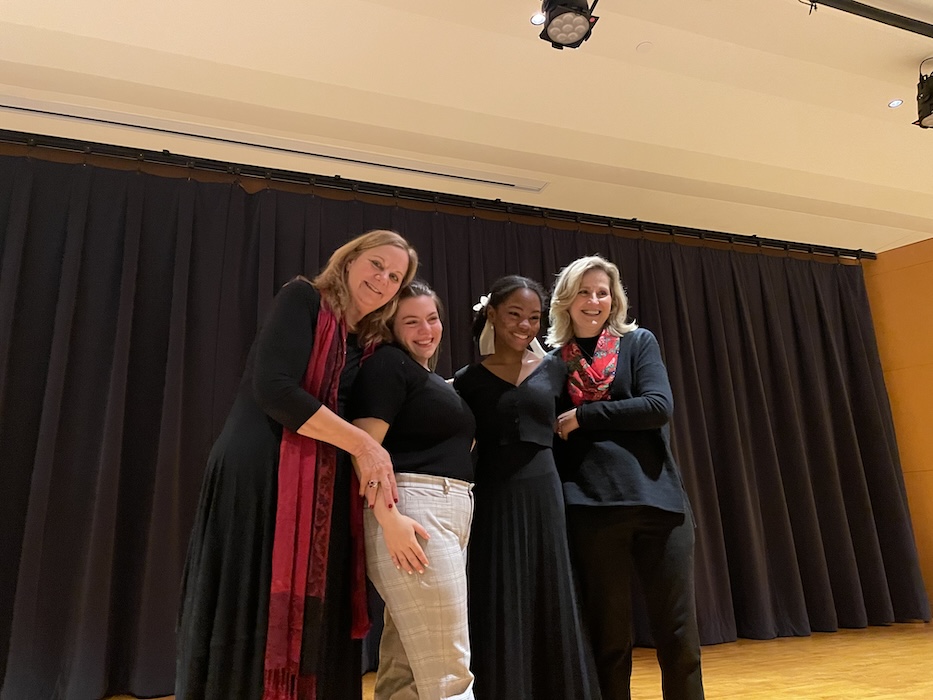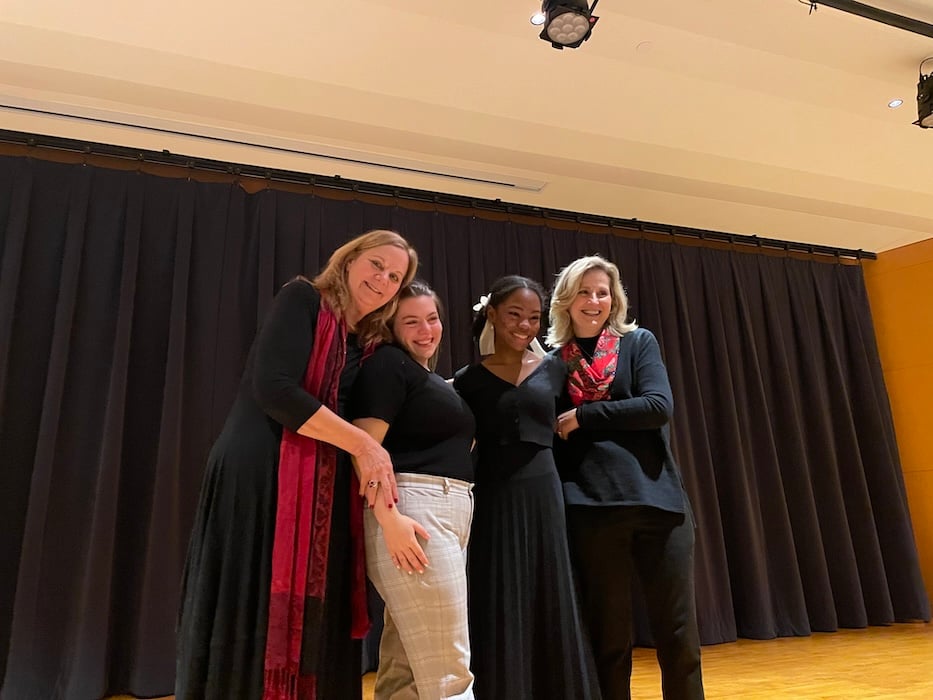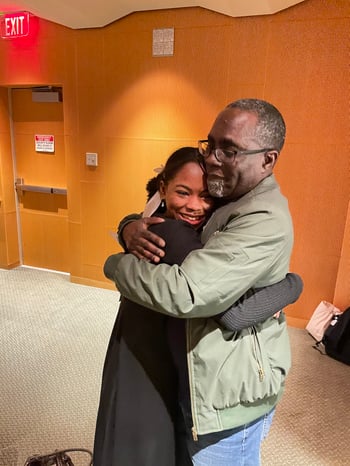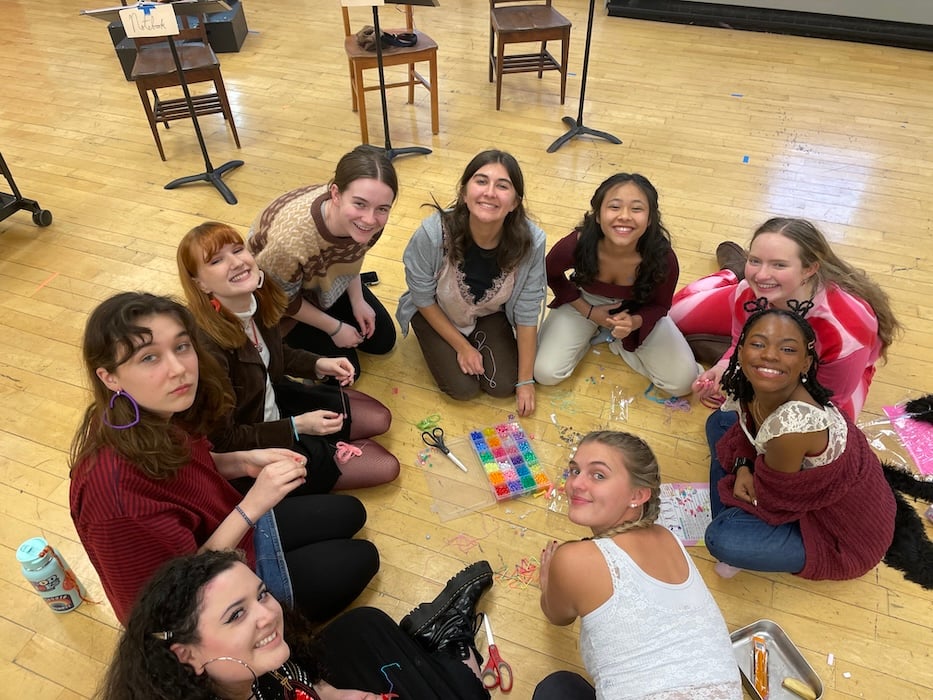
Education & Youth | Educational Center for the Arts | Arts & Culture | Theater

Carolyn Ladd, ECA Students Madeleyna Gugliotti and Daia Jade Johnson, and Ingrid Schaeffer. Photo Courtesy of Ingrid Schaeffer.
Daia Jade Johnson found new meaning in the words of a lovestruck teenager from 16th-century Verona. Now, she's taking what she learned to Lincoln Center to perform on a national stage.
Back in New Haven, a whole theater community is cheering her on.
Johnson, a senior at ACES Educational Center for the Arts (ECA), will represent the school this month at the English-Speaking Union (ESU) National Shakespeare Competition, performing works by the Bard alongside students from across the country. After months of preparation and close reading, she has made two of Shakespeare's works her own—and come away with a new understanding of how they've lasted for centuries.
"The work that you have to put into Shakespeare to understand it as someone living in the 21st century is what speaks to me," Johnson said in a recent phone call. "Because it's so different from what I'm used to, when I finally do understand it, it's that much more satisfying. It’s comforting that these experiences are something I can relate to and are not just specific to me.”
At Lincoln Center, Johnson will be performing the “Banished” monologue from Act Three, Scene Two of Romeo & Juliet and Shakespeare’s Sonnet 80—both works in which one party is in direct conflict with another. In the first, Juliet is trying to reconcile her love for Romeo with her allegiance to her cousin Tybalt, whom Romeo has killed. In the second, a poet admits lyrical defeat to a peer, comparing their styles to two ships at sea.
 For her, the performance of both is about holding that tension, and also finding a certain tenderness. “I've never connected as much to myself and to other people—to an audience, viewers—as I have while engaging in the art form of theater,” she said. “I think it's very important and something I’m passionate about.”
For her, the performance of both is about holding that tension, and also finding a certain tenderness. “I've never connected as much to myself and to other people—to an audience, viewers—as I have while engaging in the art form of theater,” she said. “I think it's very important and something I’m passionate about.”
The competition, which follows a statewide win earlier this year, is April 15. But the path to Shakespeare has been years in the making. Over a decade ago, Johnson first dipped her toe into theater as a young kid in Waterbury, where performance about the town’s history led her to the group Shakesperience, and later to voice over roles in television and film. By the time she was in middle school, voicing characters in Pinkalicious & Peterrific, “I definitely knew that I wanted to act for my whole life,” she said.
The Bard wasn’t yet on her radar, but a hunger for more rigorous training in theater was. In eighth grade, while playing the kid sister Anna in a performance of Frozen, she heard about ECA from a friend’s brother. It sounded like a fantasy, she said: she’d never known that Connecticut had a place that was part-high school, part-conservatory. “I just found the idea so awesome,” she remembered, her voice bright.
When Johnson began her freshman year online in fall 2020, she soaked up every bit of what she was learning, savoring hours-long Zoom lessons and Thursday afternoons she got to spend masked up at school. In and outside of the classroom, she took every acting opportunity she could, from Greta Berghammer’s adaptation of Oscar Wilde’s Broken Hearts to summer theater camp.
“Even on Zoom, she just radiated,” said Ingrid Schaeffer, chair of the school’s theater department. “I could see that she had enormous curiosity, this hunger and thirst. She came to every Zoom class, and she stayed engaged even when we were losing the WiFi.”
“One of the aspects of her personality is she takes your direction and makes it her own,” she continued. “In [current] rehearsals for [Arthur Kopit’s] Chamber Music, she just flies! She comes up for better choices than I can give her.”
That summer, she jumped into City Youth Theater’s performance of A Midsummer Night’s Dream, cast as Hermia as she mined her first brush with Shakespeare for meaning. She loved the way she had to sit with the text, reading and rereading the words as her character took shape. As she thought about Hermia, whose father is trying to force her into a loveless marriage, she mined the character for meaning. “It was such an amazing time,” she said. “That’s when I first got the inkling that I might really like Shakespeare.”
The show was still with her when she returned to school junior year, and joined the mostly-senior cast of Much Ado About Nothing. As she stepped onto the stage as Margaret, she realized that she loved Shakespeare not in spite of its difficulty, but because of it. She was hooked.

The cast of Arthur Kopit's Chamber Music in rehearsal. Ingrid Schaeffer Photo.
“Not only was he an amazing writer and storyteller, but there is so much love in Shakespeare,” she said, with high praise for ECA instructor Benjamin Curns, who has played over 100 of Shakespeare’s roles. “I really started to understand the poetry of Shakespeare, and why he uses the words he uses.”
Last semester, that love for the Bard was very much alive as she transformed into Autolycus in A Winter’s Tale. Unlike Margaret, who is a maidservant and relatively minor role, Autolycus is a wiley Jack-Of-All-Trades—he shape-shifts, undermines, steals, sings, and dances. His job on stage, Johnson explained matter-of-factly, is to be the comic relief in an otherwise heavy show.
During rehearsals and the ensuing show, Curns said, there was nothing she couldn’t do—even when the size and scope of the role intimidated her. “She has a certain fearlessness,” he said in a phone call last week. “I think there were things that scared her about the part, but she would come out there” and just power through, jumping from song to gentle acrobatics on stage like it was nobody’s business.
That fearlessness has also fed Johnson’s curiosity. When she decided to compete in ESU’s statewide Shakespeare competition, she looked for a monologue “with a lot of emotional investment,” she remembered. Juliet, who seemed to be completely at war with herself, fit the bill. So did the narrator in Sonnet 80, whose sense of candor radiated through the words.
As she studied the texts, she worked to make both her own. First, she said, she connected with Juliet’s running train of thought, in which she realizes that two things in her life are directly at odds with each other, and she may not find happiness because of them. Then, in rereading the sonnet, she was moved by how vulnerable the narrator could be.
She credited Curns, as well as ECA’s Schaeffer and Carolyn Ladd, with helping her understand the text. Curns, in turn, praised a wiser-than-her-years sensibility in interpreting the Bard, including rhyme and meter that leave space for breath or silence.
“You have to find the love, you know?” Johnson said. For instance, “There's so much anger, and so much betrayal and heartbreak in The Winter’s Tale, but one thing we tried to remember as a cast was to find love. Leontes doesn't banish Hermione to a cave because he hates her. He banishes her because her betrayal has caused him to do reckless things.”
For Schaeffer, the competition in New York—and Johnson’s win in Greenwich earlier this year—is a victory for the entire school, and a reminder of why she does the work she does. When Johnson competed in Greenwich, Schaeffer recalled, the sonnet hung in the air long after she had left the stage (“She lived on that stage and she left a part of herself on that stage,” Schaeffer said).
Now, she’s excited to see her pupil soar at Lincoln Center. She praised Johnson’s work in both rehearsals for Arthur Kopit’s Chamber Music, in which she plays Pearl White, and in the department, where she’s become a leader and deep listener among her classmates. On April 15, all of ECA will be rooting her on from New Haven.
“Technically, she’s doing everything right," Schaeffer said. “I think what will make her make the top 10 and possibly win the entire competition is her own connection to the material. She communicates, she resonates. You feel what she feels, you shake with her, you cry with her.”
“Sometimes, what young actors do is they use the tension that they are feeling because they are scared, and she doesn't do that,” she continued. “She finds something in her own life to connect to the character. That's the way she communicates. That’s the way she lives in the world.”

